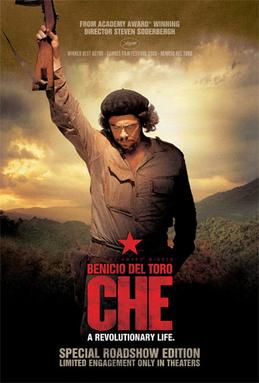 Che's very title is a lie. It's a lie because Steven Soderbergh's 2008 two-part opus is not a biopic. Because, despite the advertising campaign's desperate attempt to convince us of the contrary, Soderbergh has not the slightest interest in showing us 'the man behind the myth'. James Verniere is right in calling Che a feature-length version of the famous portrait, but wrong in considering that a flaw.
Che's very title is a lie. It's a lie because Steven Soderbergh's 2008 two-part opus is not a biopic. Because, despite the advertising campaign's desperate attempt to convince us of the contrary, Soderbergh has not the slightest interest in showing us 'the man behind the myth'. James Verniere is right in calling Che a feature-length version of the famous portrait, but wrong in considering that a flaw. Che: Part One (also known as The Argentine) opens with Che Guevara giving a radio interview in New York. The scene is shot in grainy black and white, with extreme close-ups of Che, and it immediately contrasts with the next scene that takes us back to Mexico City in 1955, and into colour and medium shots. This progression through opposites is preserved throughout The Argentine as Soderbergh switches between black-and-white scenes of Che's visit to the United States in 1964 and an account of the Cuban Revolutionary War from the beginning to the victory; the film ends with the victorious revolutionary troops on their way to Havana after the decisive battle of Santa Clara. By contrast, Che: Part Two (Guerrilla) is structured as a single relentless slog from Guevara's arrival in Bolivia in late 1966 to his capture and execution by the military eleven months later. It's a difficult experience to sit through as the situation of the guerrillas goes from bad to worse to catastrophic, with no relief in sight.
Watching Che is in many ways a jarring experience to us consumers of Hollywood films. The biographical picture in our depoliticised culture bestows on its hero a simple, everyday motivation: William Wallace in Braveheart fights the English because they murdered his wife, Johnny Cash in Walk the Line becomes a tortured musician because of his abusive father and dead brother. Both films personalise a process that is in reality larger than the individual, but which, the filmmakers assume, the audience won't understand or care about: thirteenth-century politics in the former, early rock'n'roll in the latter case – thus draining whatever subversive content the material may have had. (As Slavoj Žižek remarks of Warren Beatty's Reds, '[e]ven the October Revolution is OK, according to Hollywood, if it serves the reconstitution of a couple'.) Hollywood attempts, foolishly, to isolate the individual as archetype from his socio-political context. In Che Steven Soderbergh resolutely refuses to do this, and the extent of his commitment becomes clear when you consider that other Che film, Walter Salles's The Motorcycle Diaries (2004). That's a good movie, but a firmly conventional one: impetuous young man sets out on road trip across South America and on his journey encounters oppressed people that make him re-think his priorities.
Che is not about a person at all. Each part opens with a map – Cuba in the first, South America in the second film – that brings home the point that what we are about to see is not about Ernesto Guevara, but about his revolutions and why one succeeded while the other failed. Soderbergh frankly admits that he had no interest in Che's personal life, and neither film tells you anything at all about the time before the Sierra Maestra. Soderbergh drives the point home by filming virtually everything in medium shot, with the very notable exception of the black-and-white 1964 scenes of Part One. Benicio del Toro's performance is a wonder to behold not because he allows us deep insights into his psyche, but precisely because it is so detached and deliberately underplayed. 'Individualism must disappear', Guevara insisted, and in Soderbergh's opus it does as Che the person disappears into his struggle.
Hollywood loves a linear narrative: it's the cinematic expression of the bourgeois idea of progress. Che, by contrast, is structured dialectically. Part One and Part Two are opposites in almost every respect. They aren't even in the same aspect ratio: The Argentine is shot in 2.35:1, while Guerrilla is presented in more cramped 1.85:1, as befits the second film's almost claustrophobic feel. Further, The Argentine employs a vibrant colour scheme rich in greens and browns, while Guerrilla is extremely desaturated, using feeble greens and blues and pale light for a sickly and depressed look.
Soderbergh insists on showing us Che not as an individual, but as a revolutionary, and a revolution is always achieved by a collective. We are not invited to ask 'Who was this man?', but 'How did he try to bring about revolution?'. This uncompromisingly political and procedural stance that led some critics to call Che curiously impersonal and dramatically unsatisfying. On the contrary: in removing the man from the revolutionary, in rejecting the accumulated clichés of the Hollywood biopic, Soderbergh has made the best possible film about a man who chose to dedicate his life to the revolution – more than that: to embody it.
No comments:
Post a Comment